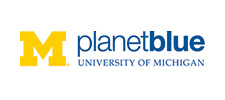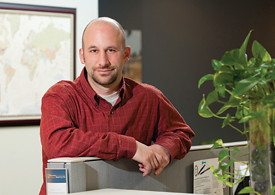
When Mike Shriberg was offered his current position of education director at the Graham Environmental Sustainability Institute in 2010, he says the timing was just right, given the leverage and potential the university has to impact environmental and sustainability issues.
“This university is at a critical moment in terms of sustainability. The commitment that (President) Mary Sue Coleman has made the last two years is of national importance. If there was ever a job that was tailor-made for my interests, this is it,” says Shriberg, who also is a lecturer I in LSA’s Program in the Environment.
Shriberg always has been interested in nature and the environment, dating back to yearly camping and backpacking trips he took with his uncle as a boy. He planned to study veterinary medicine at Cornell, until the summer before college when he worked as a nature camp counselor in his native Ohio.
Shriberg learned that the river the camp was on was the most polluted body of water in the state, and the kids he was responsible for had played in that water all summer. Realizing he had exposed children to toxic chemicals opened his eyes to environmental problems, and inspired him to change his career path.

Photo by Scott Soderberg, U-M Photo Services.
Shriberg studied biology at Cornell before coming to Michigan for his graduate work. He enrolled in the School of Natural Resources and Environment, and earned a master’s degree and a doctorate in resource policy in 2002, focusing on campus sustainability. He directed the environmental studies program as a faculty member at Chatham University in Pittsburgh, and served as director of Environment Michigan and then policy director for Ecology Center while teaching as an adjunct lecturer at U-M before returning to the university full-time.
Today, Shriberg is responsible for catalyzing integration of sustainability across the curriculum and running the Graham Institute’s education programs. Among them is the Sustainability Scholars Program, in which a select group of undergraduates complete an 11-credit series of courses and related activities geared toward building future sustainability leaders. He also runs the Graham doctoral fellowship program, which funds 12 students at a time to become part of a community of scholars focused on sustainability while completing their dissertations. Shriberg serves as an adviser and mentor to those students.
He also teaches Sustainability and the Campus, a capstone course in the Program in the Environment and one required for the Sustainability Scholars Program. In the project-based course, students work in teams and serve as “sustainability consultants” to operational units on campus. Their projects have led to significant actions on campus, including the birth of a garden near Elbel Field, the creation of the “How to be a Green Wolverine” guide, the design and implementation of a campus sustainability interactive map, and greening efforts for the commencement exercises as well as Camp Michigania. “It’s a get-your-hands-dirty class,” Shriberg says.
Access to natural areas, and the ability to go there with my family.
What is your favorite spot on campus?
Views from the top floors of the library.
What inspires you?
My children, students, and passion for restoring ecological and social sanity.
What are you currently reading?
“Situations Matter,” a social psychology book written by a friend of mine from my youth.
Who had the greatest influence on your career path?
My uncle, who took me backpacking from an early age; my high school field biology teacher; and my parents.
In addition, he co-teaches a sustainability leadership development course, and a training seminar for Planet Blue ambassadors, who serve as environmental peer advisors in the residence halls.
Shriberg says there is no better time than now to put an emphasis on sustainability. “It’s a way of thinking that should lead to improving quality of life for people while restoring ecological systems.”
What moment in the classroom stands out as the most memorable?
Student presentations for my Sustainability & the Campus course. They work extremely hard on these projects, and amaze me with their results and presenting abilities every semester.
The weekly Spotlight features faculty and staff members at the university. To nominate a candidate, please contact the Record staff at [email protected].

